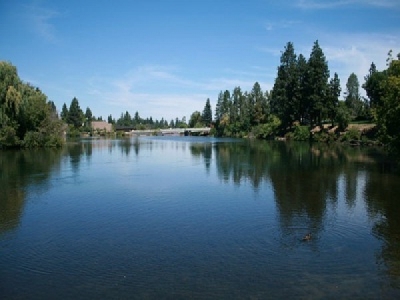
Posted on October 11, 2016
By Nicole Vulcan, Source Weekly
A local investor group, Mirror Pond Solutions, is calling for the City of Bend to take more action to address the problem of sediment buildup in Mirror Pond. The City of Bend is calling into question the methods by which that group is basing its claims.
On July 29, Jason Conger, attorney for Mirror Pond Solutions, filed comments with the Oregon Department of Environmental Quality, calling for the City of Bend to address several issues related to a pending National Pollutant Discharge Elimination System permit – part of the city’s water quality permit through DEQ. Mirror Pond Solutions owns the 23.5 acres of land below the high water line of the Deschutes River, which make up Mirror Pond in downtown Bend.
The letter states that MPS engaged PBS Engineering and Environmental to collect water and silt samples from Mirror Pond. According to the MPS comments, the water’s turbidity–or particles suspended in water–as well as total suspended solids and silt deposits all exceeded DEQ-mandated acceptable limits. In addition, and more significantly, the MPS letter stated that “none of the outfalls are monitored” by the City. Outfalls are drains that flow directly into the Deschutes River from storm water runoff.
The recommendations listed in the MPS comment to DEQ are to have the City of Bend better monitor its storm water outflows for evidence of silt deposits, to address funding for dredging, and to develop and implement a long-term solution to the discharge of polluted water into Mirror Pond.
The culprits, according to the MPS letter, are the runoff outfalls from “different parts of Bend on both sides of the Deschutes River.” According to the letter, 15 City outfalls aggregate runoff as well as discharging untreated storm water from City streets directly into Mirror Pond during every rain and snow melt event.
The letter states: “It is reasonable to conclude that stormwater discharge from City streets contributes to the majority of the silt that accumulates in Mirror Pond each year.” MPS is asking for a change to the City’s NPDES permit to address the problem. Mirror Pond Solutions is asking the DEQ to step in to enforce the Clean Water Act which may force the City to bear the burden of dredging Mirror Pond.
The issue of what to do with Mirror Pond is nothing new to Bend residents and its governing bodies. In March 2015, the Bend City Council narrowly voted to support the plan offered by the Mirror Pond Ad Hoc committee–also approved by the Bend Park & Recreation District–to replace the failing Newport Dam, owned by Pacific Power. That effort–a long process that involved many community groups–hit another snag this June, when Pacific Power announced that the dam was sound and it would continue to use it for hydropower, as it had long done. Mirror Pond Solutions had announced earlier this June its intent to purchase the dam and to dredge the pond. At that time, where the money would come from was unclear, but under that plan, Bend Park and Recreation District would handle the rehabilitation of the bands of Mirror Pond, while MPS would buy the dam and secure funding to dredge the pond. According to reports, Pacific Power is still willing to work with MPS should they continue with the dredging effort.
To address the letter MPS sent to DEQ, City of Bend Utility Director Paul Rheault issued his own letter to DEQ officials September 27. In that letter, Rheault says: “Given the number of inaccuracies in the letter provided, the City felt it important to provide clarification, context, and factual corrections to the DEQ.” For one, the City’s letter states that in addition to the City’s outfalls, “there are additional outfalls that drain private streets, such as in the Old Mill District,” and that those private outfalls are not part of the City’s system. Rheault’s letter also notes that the City does indeed monitor six outfalls at least twice a year, and does ambient water quality monitoring.
In addition, the City’s letter pointed to a 2010 report created by the Upper Deschutes Watershed Council, which found that turbidity was actually decreasing in the “area of City river miles.” Further, the City letter points out that the MPS data was collected during the renovation of the Colorado dam and the construction of the instream water park, when excavator work was putting heavy sediment into the water. The City letter also states street runoff is not contributing all the total petroleum hydrocarbons to the river sediment, as the MPS letter alleges.
Rheault’s letter ends with a note that “the connection between dredging to promote water quality is not readily clear.” He goes on to state that the “DEQ water quality controls would not include funding for dredging a river.”
In the ongoing saga of Mirror Pond, it’s clear that the emphasis has shifted from a conversation around what to do with Mirror Pond, to a one-solution argument favoring dredging over other possible solutions. But be it from city coffers, federal clean up grants or individual property owners, where the money for dredging is coming from is still very much up in the air.
Source: Source Weekly





